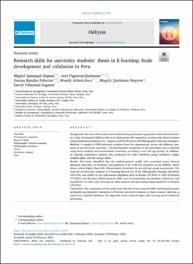| dc.contributor.author | Ipanaqué-Zapata, Miguel | |
| dc.contributor.author | Figueroa-Quinones, Joel | |
| dc.contributor.author | Bazalar-Palacios, Janina | |
| dc.contributor.author | Arhuis-Inca, Wendy | |
| dc.contributor.author | Quinones-Negrete, Magaly | |
| dc.contributor.author | Villarreal-Zegarra, David | |
| dc.date.accessioned | 2023-09-22T17:27:02Z | |
| dc.date.available | 2023-09-22T17:27:02Z | |
| dc.date.issued | 2023-02-16 | |
| dc.identifier.uri | https://hdl.handle.net/20.500.13053/9440 | |
| dc.description.abstract | “Background: The aims of the study was to evaluate the psychometric properties and to characteristics
of a scale on research skills as well as to characterize the experience of university thesis students
using information databases (i.e., Scopus or Web of Science) and bibliographic reference managers.
Methods: A sample of 1598 university students from five departments, acroos the different campuses of one Peruvian university. The psychometric properties of the instrument were evaluated
using factor analysis and measurement invariance according to sex and age groups. In addition,
an internal consistency analysis was conducted for scale reliability using Cronbach’s alpha,
ordinal alpha, and the omega index.
Results: Our study identified that the unidimensional model with correlated errors showed
adequate indicators of reliability and goodness of fit, with the exception of the RMSEA, which
shows values higher than 0.08. Measurement invariance by sex and age group was present. The
majority of university students in E-learning showed use of the bibliographic manager Mendeley
(52.13%), low ability to use information databases such as Scopus (22.24%) or Web of Science
(17.26%), and the least skilled research skills were in formulating the problem, objectives, and
hypotheses (51.63%) and carrying out data analysis and processing using statistical techniques
(49.37%).
Conclusions: The conclusions of the study were that the 8-item research skills instrument presents
acceptable psychometric indicators in Peruvian university students in thesis courses. Likewise, a
scarce use of global databases, the approach to the research topic, and carrying out its statistical
processing.“ | es_PE |
| dc.format | application/pdf | es_PE |
| dc.language.iso | eng | es_PE |
| dc.publisher | Elsevier Ltd | es_PE |
| dc.rights | info:eu-repo/semantics/openAccess | es_PE |
| dc.rights.uri | https://creativecommons.org/licenses/by/4.0/ | es_PE |
| dc.subject | "Psychometric properties Research skills Bibliographic reference manager Bibliographic databases Thesis University students Peru " | es_PE |
| dc.title | Research skills for university students’ thesis in E-learning: Scale development and validation in Peru | es_PE |
| dc.type | info:eu-repo/semantics/article | es_PE |
| dc.identifier.doi | https://doi.org/10.1016/j.heliyon.2023.e13770 | |
| dc.type.version | info:eu-repo/semantics/publishedVersion | es_PE |
| dc.publisher.country | NL | es_PE |
| dc.subject.ocde | 3.00.00 -- Ciencias médicas, Ciencias de la salud | es_PE |


